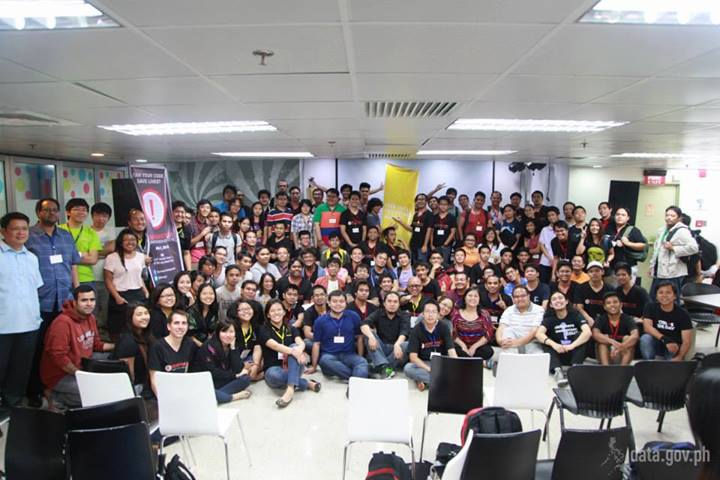Readysaster: Hacking for a More Resilient PH
“The internet has been as disruptive to the world as a much older invention, the invention of the printing press. … Once you’d invented the printing press you could share ideas so quickly that no idea could ever be killed—especially a good idea.”
These words, from Usec. Manuel L. Quezon III’s closing remarks, encapsulate the driving principles behind Readysaster: Hack for Resilience. Held last May 10-11 at Smart Tower, Makati City, the hackathon brought together teams of developers in a competition to create apps for better disaster preparation and management. It followed the success of last year’s #KabantayngBayan hackathon, which was also spearheaded by Open Data Philippines.
Day One mostly involved breakout sessions and consultations. Team members fanned out to attend sessions with technologists and data experts, who provided them with the tools and information they would need for hacking. These mentors also remained available for consultations later that afternoon. Participants were given a chance to discuss their app ideas with them, as possible solutions for the problem statements they had been given. Hacking officially started in the evening, lasting well into the night.
Most of the participants continued on without sleep, hacking until noon the next day. After lunch, the teams presented their apps to a rapt audience, and by afternoon’s end the judges had finalized the results of their deliberations.
The six judges were Usec. Richard “Bon” Moya from the Department of Budget and Management (DBM), Dr. Mahar Lagmay of Project NOAH, Czarina Medina-Guce of the Union of Local Authorities of the Philippines (ULAP), Yewondwossen Assefa of the World Bank Global Facility for Disaster Reduction and Recovery (GFDRR), Dr. John Paul Vergara of the Ateneo de Manila University, and George Parilla of Microsoft Philippines.
Four technical judges were also present to examine and appraise the apps’ codes. They were Don Pacheco of Integrated Open Source Solutions, Melvin Fetalvero of Get Hooked 360, Zer Cabatuan of Chikka, and Sony Valdez of Phyton.
These are the official results:
Grand Prize
iLigtas by Team Gordon College CCS (Marc Anthony Reyman, Jedidiah Ninonuevo, Erlinda Abarintos, Armilyn Martinez)
iLigtas is an easy-to-use, cross-platform mobile application that helps prepare users for, aids them during, and helps them recover from disasters. Using crowdsourced data obtained via SMS, geotagging, and social media feeds, the app creates infographics and provides relevant data to users.
Silver Prize + Best Student Group
AlistoPH by Team Kung San Man Tutungo at Kung Kailan Kami Hihinto (Jose Marcelius Hipolito, Aaron Noel de Leon, JM Ramos (University of the East))
AlistoPH is a management system that allows users to track incidents and disasters within a specified scope.
Help the Government (Special Award)
DisasterHub by teamcannhass (Marie Claire Pascua, Neil John Ortega, Hykinel Bon Guarte, Jonathan Wong)
DisasterHub is a tool composed of a web dashboard and a mobile application. It aims to help government agencies and local government units in sending public alerts as well as in collecting exposure data and assessing post-disaster damage.
Jury Prize (Special Award)
Alertness in Disaster (AID) System by Team DIO (Raymande Leano, Erickson Leynes, Christian Balagbag, Buena Montalbo)
AID System is a multifaceted app that allows users to subscribe to email and text advisories, report disaster events, and send out their GPS locations to loved ones in cases of emergency.
Inclusive Technology (Special Award)
e-Ulat by Team Hail Hydra (Jhoanna Isla, Aia Sia, Noel Victorino)
Through the e-Ulat system, agencies can receive post-disaster reports via SMS from survivors and volunteers on the ground. These data can then be compiled to form more detailed post-disaster reports.
Microsoft Special Award for Best Windows Phone App
Heartbeat by Team Heartbeat (Christian Danos, Geoffrey Ayap, Hans Christian Torres, Allan Danos)
Heartbeat is a geolocation tool that tracks the beats (pings) of people or assets through real-time mapping. Pending a disaster, it uses Project NOAH data to inform users of possible risks within their vicinity. It also updates the server about users’ last known locations and plots possible escape paths.
Other teams also came up with their own apps, bringing the total number of apps created during the hackathon to 24. In terms of participants, the event drew 113 hackers and around 250 attendees over the course of two days.
More than anything else, Readysaster’s success is a testament to the indomitable Filipino spirit, the collective passion to find new solutions and build a more climate-resilient country. As Usec. Quezon told the hackers, “I think you’re here because there’s a part of you that really wants to make a difference. That while the world is your oyster because you guys have the skillz with a z…you are here because of that old-fashioned word caring. … And that’s something no one can thank you for because it’s not something you do for someone else’s thanks.”
Readysaster: Hack for Resilience was a project by Open Data Philippines. It was organized in collaboration with Code for Resilience and the World Bank GFDRR. Partner institutions included DOST Project NOAH and NAMRIA, with contributions from the following government agencies: DPWH, DSWD, BSWM, and MGB. The event was made possible through partnerships with Smart Developer Network, Microsoft Philippines, Google, Google Developers Group, and WhenInManila.com, as well as the support of Smart Bro, Coffee Bean and Tea Leaf, Mozilla Philippines, and Chikka Philippines.
Readysaster is part of Code for Resilience (C4R), a World Bank GFDRR project which aims to build communities’ resilience to natural disasters through innovative uses of information and communication technologies. Accordingly, Readysaster participants submitted their apps to C4R’s Online Innovation Challenge, to compete with other entries from all around the world. Global winners will be flown to the July 2014 Understanding Risk Conference in London, England.





